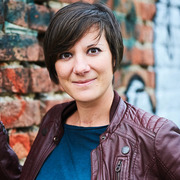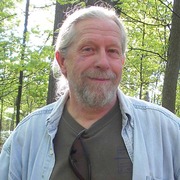
Shannon Gayk is an associate professor of English and a scholar of religious writing and art from the Middle Ages to the present. Her book, This Mortal World: Ecological Attention and the Work of Care in Middle English Literature is forthcoming in 2024 from the University of Chicago Press. She is particularly interested in the relation between ecological contemplation and action, exploring how cultivating practices of attention to the more-than-human world can invite activism on the world’s behalf, and is working on developing a Contemplative Ecologies lab that studies and encourages ecological attention and action. She regularly teaches courses on environmental writing, including special topics classes on eco-poetry, the literature of walking, the poetics of disaster, and the long history of pastoral, from ancient Greek poetry to the new agrarianism and climate fiction. She is also a member of the City of Bloomington’s environmental commission.

Teresa Kovacs is an Assistant Professor in Germanic Studies and the Director of the Institute of German Studies. She is a scholar trained in literature, theater, film, and media studies with an expertise in theater theory, the politics of aesthetics, theater and the sciences, transcultural theater, and questions of aesthetics for/of the (post-)Anthropocene. She explores these fields predominantly in the context of German-language theatre in the 20th and 21st century. Kovacs is author of the books Drama als Störung [Drama as Disruption] and Theatre of the Void: Plasticity, Hauntology, and Nuclear Blast. Her monographs reflect her attempts to grasp and name the theatrical imaginary of our present, which goes beyond drama and representational theater and always seems to defy description-- she explores the groundlessness of being as revealed in our techno-scientific age, the influx of "secondary drama," and explores indeterminacy as determined by the Anthropocene.
Her research considers questions of (post-)Anthropocene aesthetics in two parts: first, Kovacs is working on a monograph of breath and breathing in literature, theatre, film, and the visual arts; and secondly, she conceives of a post-Anthropocentric poetology for contemporary theater reinventing Bertolt Brecht's groundbreaking theoretical dialogue Messingkauf (Buying Brass) for our present.

Rebecca Dirksen is Laura Boulton Professor and Associate Professor in the Department of Folklore and Ethnomusicology and is co-founder and current director of the Diverse Environmentalisms Research Team (DERT). Working across the spectrum of musical genres in Haiti, Dirksen’s research priorities revolve around diverse environmentalisms, sacred ecologies, and environmental justice; disaster, humanitarianism, and grassroots development; carnival, protest, revolution, and politically engaged music; and applied, engaged, and activist scholarship. Dirksen is the author of the book After the Dance, the Drums Are Heavy: Carnival, Politics, and Musical Engagement in Haiti (OUP, 2020) as well as co-editor of the volume Performing Environmentalisms: Expressive Culture and Ecological Change (Illinois, 2021). She was co-PI on a Mellon-funded Humanities Without Walls Grand Research Challenge titled “Field to Media: Applied Musicology for a Changing Climate” (2018-2020). Dirksen has published extensively on environmental degradation (especially relating to trash and trees) and eco-musical activism and is completing a book on sound, sacred ecologies, and environmental justice in Haiti.

Mary Embry is a Senior Lecturer of Merchandising and Fashion Design in the Eskenazi School of Art, Architecture + Design. Her teaching and advocacy work focuses on sustainability and fair trade in the materials supply chain. Embry is a recognized practitioner of high impact learning and advocates for community engaged scholarship and teaching. She is the founder of Fair Trade Bloomington, which has taken her to participate in building partnerships with artisans in the Dominican Republic, Uganda, Kenya, China, and Ecuador; Currently she leads study abroad courses in sustainable production in Italy and Guatemala.

Brian Forist teaches in the Department of Health and Wellness Design. His research interest include outdoor recreation; recreation management; science-based management of parks and protected areas; visitor experiences in parks, protected areas, museums and other leisure/tourist sites; visitor-centered, two-way interpretation through dialogue; free-choice, constructivist teaching and learning; environmental education; human ecology, interdisciplinary environmental studies; humans and nature; natural and cultural history of the United States.

Sara Gregg is an associate professor of history whose work centers on environmental and agricultural change. She is currently completing a manuscript entitled Prairie Metamorphosis: Hidden Histories of the Homestead Era on the US Great Plains that embeds human and natural histories into the large sweep of land policies that reshaped the American West. Earlier publications focused on US conservation planning during the New Deal and on agrarian writing about the American nation-state. She teaches classes on law, environment, policy, and US history and is affiliated with the Ostrom Workshop, the Environmental Resilience Institute, and a co-convenor of the global Women’s Environmental History Network (WEHN).

Chancellor’s Professor Emeritus of Biology, Roger Hangarter’s work brings together plant biology and art. Hangarter developed the sLowlife and Plant Dance exhibits, and the Plants-In-Motion website to bring a greater awareness of plants to broad audiences. Hangarter’s photography and time-lapse movies have been exhibited in various museums and galleries across the US.

Sarah Mincey is a social-ecological systems scientist who studies natural resource management with particular emphasis on urban forest management. She serves as a clinical associate professor in the O’Neill School of Public and Environmental Affairs, as the managing director for the Environmental Resilience Institute (ERI), and as the director for the Integrated Program in the Environment and the IU Research and Teaching Preserve. She maintains her research activity through the Ostrom Workshop, ERI’s Urban Green Infrastructure Research Group, and the Bloomington Urban Forestry Research Group. Mincey is a co-founder and member of the executive committee of the Indiana Community Forestry Council advising the State's Community and Urban Forestry Program within the DNR. She is also co-founder and board vice president for CanopyBloomington, a nonprofit focused on equitably growing the urban forest in Bloomington, Indiana.


